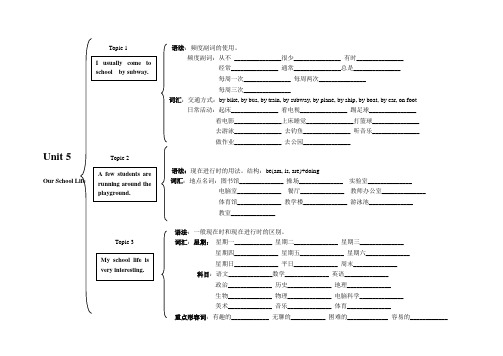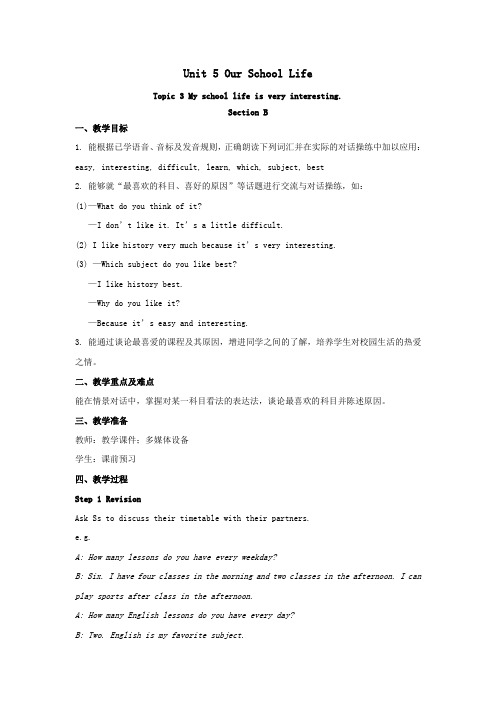【新版】仁爱版七年英语下学期Unit 5 our school life 学案6
- 格式:doc
- 大小:100.00 KB
- 文档页数:2

频度副词:从不_______________很少_______________ 有时_______________经常_______________ 通常_______________总是_______________每周一次_______________ 每周两次_______________每周三次_______________词汇:交通方式:by bike, by bus, by train, by subway, by plane, by ship, by boat, by car, on foot日常活动:起床_______________ 看电视_______________ 踢足球_______________看电影_______________上床睡觉_______________打篮球_______________去游泳_______________ 去钓鱼_______________ 听音乐_______________做作业_______________ 去公园_______________Unit 5语法:现在进行时的用法。
结构:be(am, is, are)+doing词汇:地点名词:图书馆______________ 操场______________ 实验室______________电脑室______________ 餐厅______________ 教师办公室______________体育馆______________ 教学楼______________ 游泳池______________教室______________语法:一般现在时和现在进行时的区别。
词汇:星期:星期一____________ 星期二______________ 星期三______________星期四______________ 星期五______________ 星期六______________星期日______________ 平日______________ 周末______________科目:语文______________数学______________ 英语______________政治______________ 历史______________ 地理______________生物______________ 物理______________ 电脑科学______________美术______________ 音乐______________ 体育______________重点形容词:有趣的____________ 无聊的___________ 困难的_____________ 容易的____________重点语法:▲练习一:选择题I go to school from Monday to Friday. I have seven ___1___ every day. Classclock.。

Unit 5 Our School Life Topic 1 Section A1学案学习重点;一般现在时在具体情景中的不同运用。
学习难点及突破策略;学习难点;短语的运用。
突破策略;展示教材相关图片。
学习流程;【阅读质疑自主探究】一.进入新课请找出SectionA/1a部分中一般现在时的句子。
----------------------------------------------------------------------------------------------------------------------------------------------------------------------------------------------------------------------------------------------------------------------------------------------------------------------------------------------------------------------------------------------------------------------------------------------------------------------------------------二,阅读提示1:1.阅读教材1----2页内容找出下列词汇;On foot by bike by sugway by plane by car by train by ship by boat2,找出你不懂的其他词汇:三,阅读提示2:1.读对话1a .回答下面的问题。
1)How does Kangkang usually come to school?2)How does Helen usually come to school ?2.读对话1a画出下面的重点句子并找出你不懂得其他问题:Happy New Year !The same to you . Your new bike looks very nice . How do you usually come to school ?I usually come to school by subway .It s time for class.____________________________________________________________-_________________________________________________________________________________________________________________________-_____________________________________________________________3.再读对话完成1b.【多元互动合作探究】1.请你将自己不理解的问题与周边同学进行交流探讨,注意认真听取他人的意见并将你认为有价值的记录下来._____________________________________________________________________ __________2.分较色朗读对话并根据1b复述对话。

本文由一线教师精心整理/word 可编辑1 / 1新仁爱版七年英语下册《Unit 5 Our School Life 》教案2学习目标:1、学习总结频度副词;2、学习表达交通方式的不同句型。
教学过程:一. 自主学习(试试看,你一定是最棒的,加油!) 1. 写出下面交通方式的不同表达go to …by subway == take the subway to … go to …by bike == _____ a bike to … go to …on foot == ____________to … _______to …by bus == take a bus to … go to …by car == _____ a car to … go to …by air_______ == fly to … 2. 翻译下面短语或句子 (1)早起的鸟儿有虫吃。
_____________________________________________ (2) 你通常怎样来上学?_____________________________________________ (3) 我有时乘地铁回家。
_____________________________________________ 二.合作交流语言点导学:( language points )1. on weekdays 在工作日/平日; on weekdays 在周末Eg: I usually study hard on weekdays and have a good rest on weekends.我通常平日努力学习,周末好好休息。
2. The early bird catches the worm.意为“笨鸟先飞”或“捷足先登”3. Maria sometimes takes the subway home. 玛丽亚有时乘地铁回家。
sometimes 是频度副词,意为“有时”。

Unit5 Our School LifeTopic1 I usually come to school by subway.Section C (1a—1c)教学设计一、Material analysis本节课主要活动是1a和1c。
主要学习学生学习生活的习惯用语,学习如何询问某事发生的频率。
同时综合复习前面所学内容。
本班学生英语学科基础较差,部分学生学习兴趣不是很足,如何询问频率十分重要,鉴于这一点,上课前应当充分备足课,知识点应让学生一点一点地归纳出来,努力提高学生的学习兴趣。
二、Teaching aims1.Knowledge aims要求学生能够会读会写知汉意的单词和短语单词:begin, after,bed.短语: at school, go to bed ,get up, have lunch, go home, after school,have dinner.语法:(1)能够说出学生学习生活的习惯用语。
(2)学习如何询问某事发生的频率。
2.Skill aims(1)能听懂有关表达日常生活的叙述;(2)能听懂简单的课堂用语,并作出反应;(3)能根据图文就交通方式和日常活动的频度等进行交流;(4)能在阅读训练中进行读前猜测、读中验证的活动;(5)能根据图文理解相关话题,抓住大意和具体信息并根据要求进行学习活动;(6)能准确写出黑体单词和词组;(7)能写出表达交通方式和频度的简单句子。
3.Emotional aims(1)在学习过程中,结合小组竞赛、同伴互助等活动,培养互相帮助、共同进步的合作精神;(2)采用角色扮演等灵活多样的学习方式,激发学习英语的兴趣;(3)通过了解他人的校园生活培养关心他人的意识。
三、The key points and difficult points1.能熟练运用usually, often, always等频度副词和两种交通方式的表达,能用一般现在时的第三人称单数表达日常活动,能对频率进行提问与回答;2.培养在阅读训练中进行读前猜测、读中验证的阅读能力;3.结合话题,运用“谈论日常活动、提问频度”等进行口头和笔头的信息输出。

Unit 5 Our School LifeTopic 3 My school life is very interesting.Section B一、教学目标1. 能根据已学语音、音标及发音规则,正确朗读下列词汇并在实际的对话操练中加以应用:easy, interesting, difficult, learn, which, subject, best2. 能够就“最喜欢的科目、喜好的原因”等话题进行交流与对话操练,如:(1)—What do you think of it?—I don’t like it. It’s a little difficult.(2) I like history very much because it’s very interesting.(3) —Which subject do you like best?—I like history best.—Why do you like it?—Because it’s easy and interesting.3. 能通过谈论最喜爱的课程及其原因,增进同学之间的了解,培养学生对校园生活的热爱之情。
二、教学重点及难点能在情景对话中,掌握对某一科目看法的表达法,谈论最喜欢的科目并陈述原因。
三、教学准备教师:教学课件;多媒体设备学生:课前预习四、教学过程Step 1 RevisionAsk Ss to discuss their timetable with their partners.e.g.A: How many lessons do you have every weekday?B: Six. I have four classes in the morning and two classes in the afternoon. I can play sports after class in the afternoon.A: How many English lessons do you have every day?B: Two. English is my favorite subject....【设计意图】复习上节课所讲内容。

Unit 5 Our school lifeTopic 3 My school life is interesting.一、重点词汇及短语:1.单词:Today adv在今天n 今天, Wednesday n 星期三, Monday n 星期一, physics n 物理, Tuesday n 星期二,geography n 地理,Thursday n 星期四, P.E. n 体育,Friday n 星期五, art n 美术, history n 历史, math n 数学, science n 科学, learn v 学习, easy adj 容易的, interesting adj 有趣的, difficult adj 艰难的, boring adj 无聊的, which pron 哪一个, subject n 学科, best adv&adj 最好地(的), between prep 在(两者)之间, Saturday n 星期六, February n 二月, hard adj 努力的adv 努力地, story n 故事friendly adj 友好的world n 世界attention n 注意stamp n 邮票,night n 夜间, place n 地点,program n 节目,newspaper n 报纸.2.短语:be over 结束outdoor activity 室外活动wait for sb 等待某人every week 每周have an English class 上英语课my school life 我的学校生活not…at all 一点也不,根本不be friendly to…对……友好learn…from…从……中学习……on Wednesdays 在星期三work on 从事from…to…从……到……二、词组例析:1.outdoor activity 室外活动activity是可数名词,其复数形式是把y变i 再加-es。
Unit 5 Section B课前预习作业:1、完成1c和2a2、频率副词和交通方式表达法一、新课导入:引导学生观察课本图片和1b中的任务,学生预测对话主要内容。
二、预习作业检查1、出示练习题,检测学生预习的单词2、提问:1)课文中出现哪些频率副词?它们之间有什么关系?2)句子The early bird catches the worm.是什么意思?3)除了用by+交通工具表示交通方式,还有哪些方式?三、新课教学1、问题引领:根据1a完成下列问题1)Michael ________ walks to school but __________ goes by bike.2)Helen ________ goes to school on foot. She _________ takes the underground.3)Sally ________ takes the underground. She ________ goes to school by bus.2、自主学习:由频率副词的学习引出对交通方式表达法的学习。
1)Li Xiang often comes to school by bike.Li Xiang often rides a bike to school.2) Maria sometimes goes home by subway.Maria sometimes takes the subway home....3、展示交流:通过模仿2a造句展示。
四、解决问题,巩固提高:Listen to the passage about Nancy’s activities and check (√) the correct answers.五、课堂小结1.We learn some words:weekday, early, bird, catch, seldom,walk, never, ride, park, watch2. We learn some phrases: take a bus/car, do one’s homework,watch TV, see a movie, play soccer3. And some sentences:The early bird catches the worm.Maria sometimes goes home by subway.Maria sometimes takes the subway home.六、布置作业:写写自己一天的活动并预习Section C的单词及课文。
Unit 5 Our School LifeTopic 1 I usually come to school by subway.Section B一、教学目标1. 能根据已学语音、音标及发音规则,正确朗读下列词汇并运用于情景对话中:weekday, early, bird, catch, worm, sometimes, seldom, walk, never, ride, park, watch, TV, television, watch TV, soccer, football, movie, film2. 在Section A的基础上,复习交通方式,能正确运用always, usually, sometimes, seldom, often, never等频度副词,同时能用介词by加交通工具和动词短语两种不同方法来表示交通方式。
3. 在情景对话中,能够表达“日常的交通方式、某项活动的频度”等语言功能,如:1) I usually come to school on foot, but sometimes by bike.2) I seldom walk to school. I often come by subway.3) I never come to school by subway.4. 使学生明白早睡早起的重要性。
二、教学重点及难点在对话操练、两两问答、小组调查等活动中,学习用频度副词来进行日常活动频率的有关表达,同时还学习和操练用两种不同的表达(介词by加交通工具和动词短语)对交通方式进行问答及切换。
三、教学准备教师:教学课件;多媒体设备学生:课前预习四、相关资源五、教学过程Task 1Step 1 Warming-upFree talk1. Work in pairs based on the following structures.T: How do you usually come to school?S1: By bike.T: How do you usually go to the zoo?S2: By bus.2. Choose a few pairs to act them out.【设计意图】复习上节课所学知识点,培养学生口语表达能力。
Unit 5 Section A课前预习作业:1、熟悉新单词,了解其读音及中文意思2、预习现在进行时一、新课导入:展示校园地点的图片,然后根据图片中的人物活动提问What is he/she doing?引入新课。
二、预习作业检查1、检查学生练习2的完成情况2、提问:给出句子,让学生猜测和总结其中的规律I am doing my homework.We/They are reading books in the library.He /She/It is playing basketball.三、新课教学1、问题引领:1)What is Jane doing?2)What is Michael doing?2、自主学习:学习现在进行时在生活中是如何运用的。
结合视频和“预习作业”开展讨论。
3、展示交流:1)回答1b的练习,初步了解学生掌握课文的程度。
2)学生回答之前提出的问题。
四、解决问题,巩固提高:1)听音并连线2)模仿3b编对话A: ..., where is Maria?B: She is ...A: What is she doing now?B: She is ...A: Is Kangkang reading in the library, too?B: No, he isn't. He is ......五、课堂小结1.短语:do some cleaning, dining hall, swimming pool, computer room.2.句型:现在进行时的肯定句式、否定句式、一般疑问句式及其回答和特殊疑问句。
六、布置作业:预习Section B以及总结现在进行时的各种句式。
Unit 5 our school life 学案6
【学习目标】
1.单词:easy, interesting, difficult
2.句型:(1)—What do you think of it?
--- I don’t like it. It’s a little difficult.
(2)--- I like history very much because it’s very interesting.
(3) --- Which subject do you like best?
--- I like English best.
(4) --- Why do you like it?
--- Because it’s easy and interesting.
【自学指导】
一.写出下列单词的意思:
easy interesting difficult boring
learn which subject best
二.你能找到它们吗?
1.你正在读什么书??
2.你认为它怎么样??
(同义句)?
3. 我不喜欢它,它有一点难。
4.我喜欢历史因为它非常有趣。
5.我们可以互相帮助吗?。
6.你最喜欢的科目是哪一个?
7.我最喜欢英语。
【当堂检测】
一.补全单词:
1.—What do you think of history? ---- I think it’s I .I like it
very much.
2. I like math ,because it’s very e .
3You read English in the morning, so you must l it well.
4. I think math is a little d . Can you hel me with it?
5. –Which s do you like best. --- I like English best.
二.仿照例句,完成句子。
Eg: In an English class, we are s eaking.
1. In an art class, we are .
2. In a math class, we are math roblems.
3. In a history class, we are the ast.
4. In a geogra hy class, we are a ma of China.
5. In a music class , we are and .
三.按要求完成句子:
1.Lucy is reading a book. (对画线部分提问)
Is Lucy ?
2. I like geogra hy because it is easy. (对画线部分提问)
you like geogra hy?
3. She has two art lessons every week. (对画线部分提问)
art lessons does she have every week?
4. How do you like math?(写出同义句)
What do you math?
5.What’s your favorite subject? (写出同义句)
do you like best?。